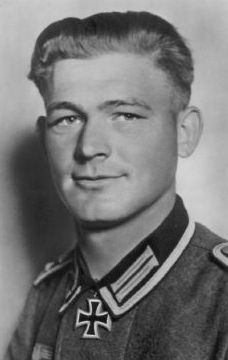Fahrenholz, Alfred
- Date of birth:
- November 4th, 1917 (Etelsen/Hannover, Germany)
- Date of death:
- May 21st, 1989 (Achim-Bierden/Lower-Saxony, Germany)
- Nationality:
- German (1933-1945, Third Reich)
Biography
Do you have more information about this person? Inform us!
- Period:
- Second World War (1939-1945)
- Rank:
- Oberwachtmeister
- Unit:
- Zugführer, 5. Batterie, II. Abteilung, Artillerie-Regiment 240, 170. Infanterie-Division, Heer
- Awarded on:
- May 5th, 1943
“Artilleryman prevents Soviet breakthrough - How Oberwachtmeister Fahrenholz earned the Knight’s Cross:
… In the middle of March a new NCO course had begun. For 4 days the soldiers of the Batterien had been gathered together in a camp. The gunfire farther north had become stronger. The Soviets were apparently launching another one of their frequent, futile attempts to smash their way through the encirclement ring around Leningrad at another position.
But the call of duty had now come. The radio came into life, signalling an alarm. The Soviets had broken in. The participants in the course now had to render service at the breach.
The soldiers went to the command post of an Artillerie-Abteilung and moved out from there. No contact existed with the neighbouring command post. Fahrenholz restored contact with a patrol, and learned that the gunners of a Batterie were already having to hold the approaching Soviets at arm’s length from their cannons with MGs and rifles.
Fahrenholz received the mission of securing a swathe of forest that the Soviets were using to advance to the road. A few other soldiers went into position here. Bangs could be heard farther ahead within the forest. Fahrenholz proceeded to wade through the belly-deep snow with a handful of soldiers, shooting and screaming, and they succeeded in pushing the Soviets out of the wood. Arriving at the edge of the forest, Fahrenholz took view of the situation.
Opposite him was a strong bunker with firing apertures that dominated the forest. Approaching it would be pointless, as it was secured by MGs and covered by further MGs from another patch of forest perpendicular to the one which Fahrenholz had to protect. A dash across the coverless terrain with his few soldiers would be suicide, especially as a T-34 was now approaching in order to help out the fleeing infantry that had been pushed back by Fahrenholz’s sudden strike. The colossus stood in the forest like a sitting duck, however no weapons to combat it were at hand. Enemy infantry were following it, and so Fahrenholz’s small unit had to pull back. A light friendly Panzer brought no relief, it was far inferior to the T-34 in armour and firepower, and so it turned around.
Unconcerned by the threat that the bunker posed to him, Fahrenholz once again went into the forest. He again deceived the enemy with loud cries and strong rifle fire. But he once again decided not to advance across the open ground. Finally however a Tiger arrived and provided some breathing space. Covered by their steel saviour, the artillerymen advanced to the bunker and cleared it out.
Soviet machine guns (which had been thrown aside by the fleeing Soviets) were brought into position at this exposed point. This position, which could dominate the forest in three directions, was then held against the continually attacking Soviets until friendly Grenadiers arrived in the evening to provide relief. In the end Fahrenholz captured a total of 2 machine guns, 7 machine-pistols, 2 anti-tank rifles, 2 mortars, a radio apparatus and a fair amount of ammunition.
Positioned totally on his own, acting on his own impetus, and repeatedly inspiring his soldiers to fight against a superior enemy. In this way Fahrenholz did not only protect a Batterie from being captured by the Soviets, but also managed to throw 5 Bolshevik attacks into confusion by deceiving the enemy as to the strength of the forces they were facing. As such Fahrenholz was able to deny the enemy a victory that had previously been just within their grasp.
An enemy breakthrough here would have not only secured a road, but also a railroad junction from which supplies for other German divisions to the northeast were delivered through.
Due to his bravery before the enemy Fahrenholz was promoted to Oberwachtmeister and decorated with the Knight’s Cross.
- War correspondent Georg W. Kruse”
- Period:
- Second World War (1939-1945)
- Period:
- Second World War (1939-1945)
Sources
- Photo 1: Wilco Vermeer
- - FELLGIEBEL, W.P., Elite of theThird Reich, Helion & Company Limited, Solihull, 2003.
- Die Ordensträger der Deutschen Wehrmacht (CD), VMD-Verlag GmbH, Osnabrück, 2002
- Axis Biographical Research
- Die Front, Edition 522, 08.08.1943.





